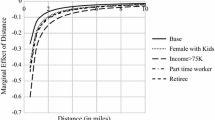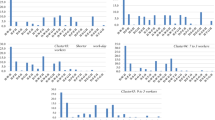Abstract
Investigation of the dynamic processes of activity scheduling and trip chaining has been an interest of transportation researchers over the past decade because of its relevance to the effectiveness of congestion management and intelligent transportation systems. To empirically examine the processes, a computerized survey instrument is developed to collect household activity scheduling data. The instrument is unique in that it records the evolution of activity schedules from intentions to final outcomes for a weekly period. This paper summarizes the investigation on the dynamic processes of activity scheduling and trip chaining based on data collected from a pilot study of the instrument. With the data, ordered logit models are applied to identify factors that are pertinent to the scheduling horizon of activities. Results of the empirical analysis show that a daily schedule often starts with certain activities occupying a portion of the schedule and other activities are then arranged around these pre-occupants. Activities of shorter duration are more likely to be opportunistically inserted in a schedule already anchored by their longer duration counterparts. Persons with children often expect more constraining activities than those with no children. The analysis also shows that female respondents tend to be more structured in terms of how the week is planned. Additionally, analysis of travel patterns reveals that many trip-chains are formed opportunistically. Travel time required to reach an activity is positively related to the scheduling horizon for the activity, with more distant stops being planned earlier than closer locations.
Similar content being viewed by others
References
Adler, T., Ben-Akiva, M.: A theoretical and empirical model of trip chaining behavior. Transportation Res. B 13B, 243–257 (1979)
Arentze, T.A., Timmermans H.J.P.: Albatross: A Learning Based Transportation Oriented Simulation System. European Institute of Retailing and Services Studies, Eindhoven, The Netherlands (2000)
Axhausen, K.W.: The data needs of activity scheduling models. Paper presented at the International Conference on Activity based Approaches: Activity Scheduling and the Analysis of Activity Patterns, Eindhoven University of Technology, The Netherlands, May 25–28, 1995
Axhausen, K., Gärling, T.: Activity-based approaches to travel analysis: conceptual frameworks, models, and research problems. Transport Rev. 12, 323–341 (1992)
Ben-Akiva, M., Bowman, J.L.: Activity based disaggregate travel demand model system with daily activity schedules. Paper presented at the International Conference on Activity based Approaches: Activity Scheduling and the Analysis of Activity Patterns, Eindhoven University of Technology, The Netherlands, May 25–28, 1995
Ben-Akiva, N., Bowman, J., Ramming, S., Walker, J.: Behavioral realism un urban transportation planning models. Paper presented at Transportation Models in the Policy-Making Process: A Symposium in Memory of Greig Harvey, Asilomar Conference Center, California, March 6, 1998
Brant, R.: Assessing proportionality in the proportional odds model for ordinal logistic regression. Biometrics 46, 1171–1178 (1990)
Cullen, I., Godson, V.: Urban networks: the structure of activity patterns. Prog. Plann. 4(1), 1–96 (1975)
Doherty, S., Miller, E.: A computerized household activity scheduling survey. Transportation 27(1), 1–23 (2000)
Gärling, T., Kwan, M.-P., Golledge, R.G.: Computational-process modelling of household activity scheduling. Transportation Res. B 28B, 355–364 (1994)
Greene, W.H.: Econometric Analysis, 3rd edn. Prentice-Hall Inc., Upper Saddle River, New Jersey (1997)
Hayes-Roth, B., Hayes-Roth, F.: A cognitive model of planning. Cogn. Sci. 3, 275–310 (1979)
Kitamura, R.: Incorporating trip chaining into analysis of destination choice. Transportation Res. B 18B, 67–81 (1984)
Kurani, K.S., Kitamura, R.: Recent Developments in the Prospects for Modeling Household Activity Schedules. A report prepared for the Los Alamos National Laboratory (1996)
Lee, M., McNally, M.G.: Experiments with a computerized self-administrative activity survey. Transportation Res. Rec. 1748, 125–131 (2001)
Lee, M., McNally, M.G.: On the structure of weekly activity/travel patterns. Transportation Res. Part A 37, 823–839 (2003)
Long, J.S., Freese, J.: Regression Models for Categorical Dependent Variables Using Stata. Stata Press, College Station, Texas (2001)
Mahmassani, H.S., Jou, R.: Bounded rationality in commuter decision dynamics: incorporating trip chaining in departure time and route switching decisions. In: Gärling, T., Laitila, T., Westin, K. (eds.) Theoretical Foundations of Travel Choice Modeling. Pergamon, Oxford (1997)
McFadden, D.: Disaggregate behavioral travel demand’s RUM Side: a 30 year retrospective. Paper presented at the meeting of International Association of Travel Behavior Research, Brisbane, Australia, July 2, 2000
McKelvey, R.D., Zavoina, W.: A statistic model for the analysis of ordinal level dependent variables. J.␣Math. Sociol. 4, 103–120 (1975)
McNally, M.G. and Recker, W.W. (1986) On the formation of household travel/activity patterns: a simulation approach. Final report prepared for U.S. DOT, Contract No. DTRS-57-81-C-0048
Metropolitan Transportation Commission: Regional Travel Characteristics Report: Bay Area Travel Survey 2000: vol. I+II (2000)
Meyer, J.S., Rebok, G.W.: Planning-in-action across the life span. In: Shlechter, T.M., Toglia, M.P. (eds.) New Directions in Cognitive Science, pp. 1–2. Ablex, Norwood, New Jersey (1985)
Prelec, D.: Values and principles: some limitations on traditional economic analysis. In: Etzioni, A., Lawrence, P. (eds.) Perspectives on Socioeconomics. M.E. Sharpe, London (1991)
Rebok, G.W.: Plans, actions, and transactions in solving everyday problems. In: Sinnott, J.D. (ed.) Everyday Problem Solving: Theory and Applications. Praeger, New York (1989)
Simon, H.A.: Invariants in human behavior. Annual Rev. Psychol. 41(1), 1–19 (1990)
Author information
Authors and Affiliations
Corresponding author
Rights and permissions
About this article
Cite this article
Lee, M., McNally, M.G. An empirical investigation on the dynamic processes of activity scheduling and trip chaining. Transportation 33, 553–565 (2006). https://doi.org/10.1007/s11116-006-7728-1
Received:
Accepted:
Published:
Issue Date:
DOI: https://doi.org/10.1007/s11116-006-7728-1




